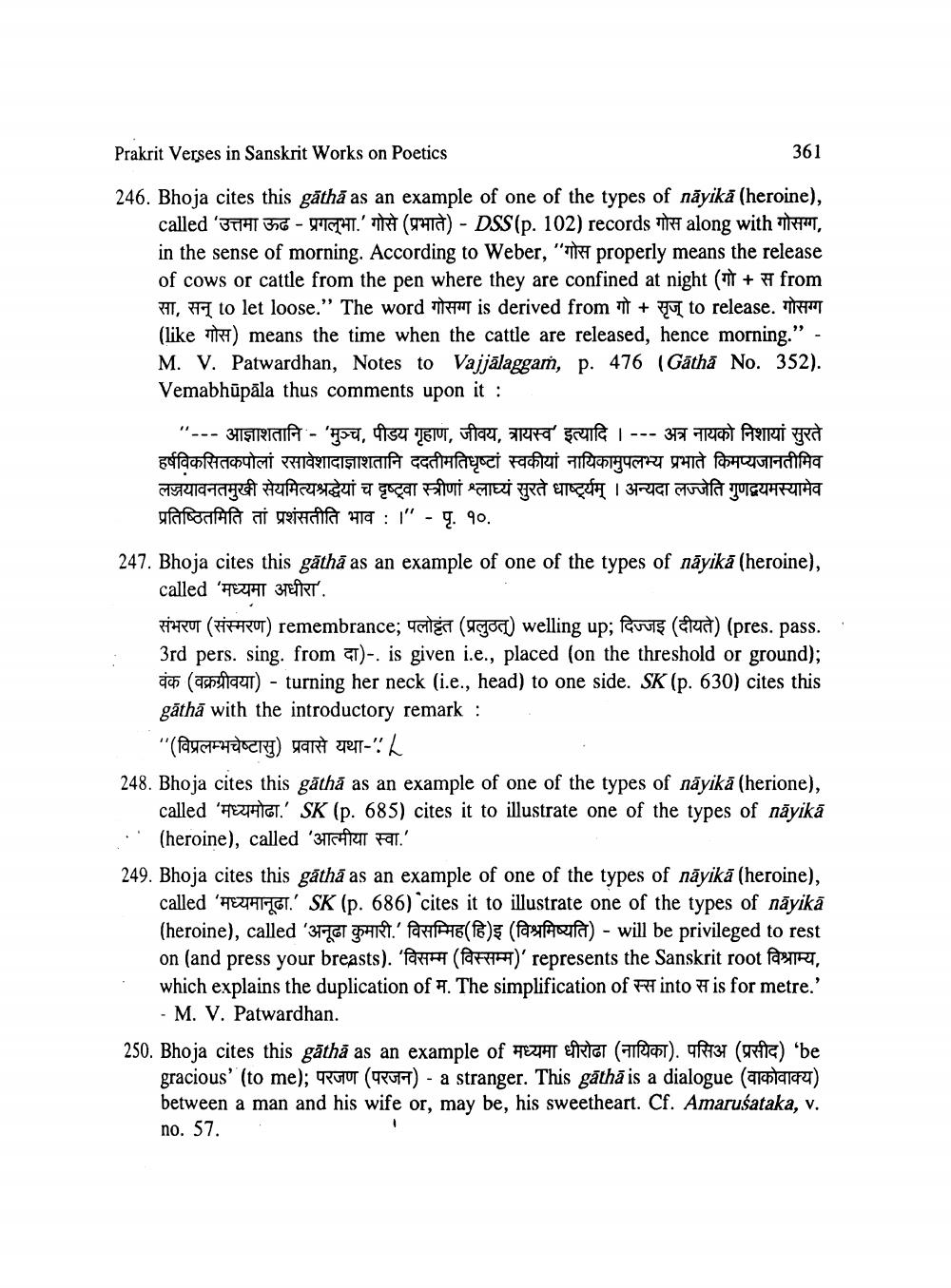________________
Prakrit Verses in Sanskrit Works on Poetics
361
246. Bhoja cites this gatha as an example of one of the types of nayika (heroine),
called 'उत्तमा ऊढ - प्रगल्भा .' गोसे (प्रभाते) - DSS (p. 102) records गोस along with गोसग्ग, in the sense of morning. According to Weber, "The properly means the release of cows or cattle from the pen where they are confined at night (गो + स from सा, सन् to let loose." The word गोसग्ग is derived from गो + सृज् to release. गोसग्ग (like गोस) means the time when the cattle are released, hence morning." -
M. V. Patwardhan, Notes to Vajjalaggam, p. 476 (Gatha No. 352). Vemabhūpāla thus comments upon it :
"--- आज्ञाशतानि - 'मुञ्च, पीडय गृहाण, जीवय, त्रायस्व' इत्यादि । --- अत्र नायको निशायां सुरते हर्षविकसितकपोलां रसावेशादाज्ञाशतानि ददतीमतिधृष्टां स्वकीयां नायिकामुपलभ्य प्रभाते किमप्यजानतीमिव लज्जयावनतमुखी सेयमित्यश्रद्धेयां च दृष्ट्वा स्त्रीणां श्लाघ्यं सुरते धाष्यम् । अन्यदा लज्जेति गुणद्वयमस्यामेव प्रतिष्ठितमिति तां प्रशंसतीति भाव : ।" - पृ. १०.
247. Bhoja cites this gāthā as an example of one of the types of nāyikā (heroine),
called 'मध्यमा अधीरा'. संभरण (संस्मरण) remembrance; पलोटूंत (प्रलुठत्) welling up; दिज्जइ (दीयते) (pres. pass. 3rd pers. sing. from दा)-. is given i.e., placed (on the threshold or ground); वंक (वक्रग्रीवया) - turning her neck (i.e., head) to one side. SK (p. 630) cites this gäthā with the introductory remark:
"(विप्रलम्भचेष्टासु) प्रवासे यथा-'। 248. Bhoja cites this gătha as an example of one of the types of nāyikā (herione),
___called 'मध्यमोढा. SK (p. 685) cites it to illustrate one of the types of nayika .' (heroine), called 'आत्मीया स्वा.' 249. Bhoja cites this gatha as an example of one of the types of nayika (heroine),
called 'मध्यमानूढा.' SK (p. 686) cites it to illustrate one of the types of nayika (heroine), called 'अनूढा कुमारी.' विसम्मिह(हि)इ (विश्रमिष्यति) - will be privileged to rest on (and press your breasts). "विसम्म (विस्सम्म)' represents the Sanskrit root विश्राम्य, which explains the duplication of A. The simplification of p into his for metre.'
- M. V. Patwardhan. 250. Bhoja cites this gatha as an example of मध्यमा धीरोढा (नायिका). पसिअ (प्रसीद) 'be
gracious' (to me); परजण (परजन) - a stranger. This gatha is a dialogue (वाकोवाक्य) between a man and his wife or, may be, his sweetheart. Cf. Amaruśataka, v. no. 57.




